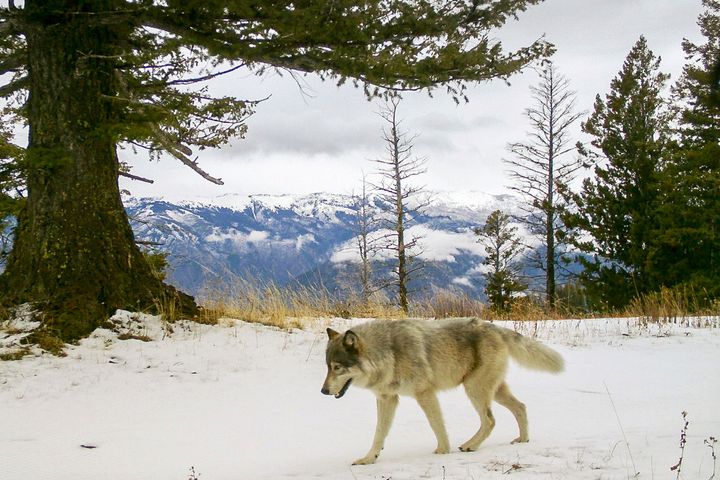Never missing an opportunity to make life easier for extractive industries, House Republicans passed a suite of bills this week to boost development and dismantle environmental protections across millions of acres of federal land.
The bills stand little chance of passing in the Democratic-controlled Senate, but they give GOP industry allies something to tout heading into the 2024 elections. And since several of the measures closely mirror priority actions found in Project 2025, the 920-page policy blueprint that dozens of right-wing organizations compiled to guide former President Donald Trump, it might be a preview of what’s to come next year should Trump win the election.
The measures seek to dismantle several of the Biden administration’s recent actions to better conserve America’s public lands and protect wildlife, including those to limit oil drilling in large areas of Alaska and mineral development near Minnesota’s Boundary Waters Canoe Area Wilderness.
Rep. Michelle Fischbach (R-Minn.) portrayed the measures as safeguards against what she described as President Joe Biden’s “war” on fossil fuels and other extractive industries — rhetoric that ignores the fact that domestic oil production and natural gas exports have never been higher.
“From energy in Alaska to minerals in Minnesota, the bills under this rule empower our domestic producers,” Fischbach said in a speech on the House floor. “The Biden administration is leaving America at a disadvantage while adversaries like China work to expand their global influence. We cannot let this happen. We can be both good stewards of our public lands and take advantage of the many resources they provide.”
Rep. Teresa Leger Fernández (D-N.M.) called the package a “great gift” to corporations and one that ignores public support for protecting wild landscapes and would overturn decades of conservation work.
The bills “fail to protect America’s blessed creation for future generations,” she said.

The package of bills passed Tuesday and Wednesday include:
- H.R. 6285 would reverse the Biden administration’s rule barring oil and gas development across more than 13 million acres of the National Petroleum Reserve on Alaska’s North Slope. It also requires the Interior Department to reissue all Trump-era oil and gas leases in Alaska’s fragile Arctic National Wildlife Refuge, which the Biden administration canceled last year.
- H.R. 3195 would rescind the Biden administration’s 20-year ban on new mineral development across 225,000 acres of national forest land adjacent to Minnesota’s iconic Boundary Waters Canoe Area Wilderness. It also would reinstate canceled leases to Chilean mining giant Antofagasta in an effort to rubber stamp the company’s controversial plans for a $1.7 billion underground copper-nickel mine on the doorstep of one of the most visited wilderness areas in the country, as well as block judicial review of any mining leases and permits in the region.
- H.R. 3397 would require the Bureau of Land Management to withdraw a new rule aimed at balancing conservation and ecosystem restoration with traditional land uses, including drilling, mining, logging and grazing. It would also prevent America’s largest land manager from proposing or finalizing any similar rule in the future.
- H.R. 764, dubbed the Trust the Science Act, would require the U.S. Fish and Wildlife Service to reissue a Trump administration rule that stripped gray wolves of protections under the Endangered Species Act. Like other bills in the package, it blocks judicial review.
- H.R. 615 would largely bar federal agencies from prohibiting the use of lead ammunition and fishing tackle on federal lands and waters.
Their passage, mostly along party lines, followed hours of fiery debate on the House floor, during which Republicans accused Democrats and the Biden administration of advancing the agenda of “radical environmentalists,” and Democrats condemned the GOP as being beholden to polluters and special interests.

One of the more contentious debates centered on the bill to block the Bureau of Land Management’s new rule to boost conservation on federal lands, which confronts the agency’s long legacy of prioritizing drilling, mining and other extractive uses. Republicans painted the Biden administration rule as an unconstitutional federal “land grab” and an attack on Western communities.
“This rule is a poorly concealed effort to lock up more lands to advance the Biden administration’s radical 30x30 agenda,” said Rep. Bruce Westerman (R-Ark.), the chair of the House Natural Resources Committee, referring to the administration’s goal to conserve 30% of America’s lands and waters by 2030. “This rule would fundamentally upend more than 50 years of land management practices across the West that rural communities have relied on for their livelihoods.”
Rep. Joe Neguse (D-Colo.) repeatedly stressed that Westerman and other Republican colleagues were mischaracterizing what the rule does.
“One need look no further than the plain language,” Neguse said. “The rule says that it’s putting conservation on par with these other uses. Grazing is allowed under the rule. Oil and gas development is allowed under the rule. Conservation is allowed under the rule. If my colleagues don’t want conservation considered by the [Bureau of Land Management] with respect to how these lands are managed, which is clearly what they believe, then they should just say so. Just be candid with the American people that they don’t think these lands should be managed with conservation in mind at all.”
Rep. Jared Huffman (D-Calif.) said the entire raft of bills “misses the mark.”
“It elevates right-wing ideology over the actual needs of the American people,” he said.
Ahead of the votes, the League of Conservation Voters, a progressive environmental advocacy organization, put lawmakers on notice that supporting the bills would likely factor into its forthcoming environmental scorecard for members of Congress.
“These extreme bills are a gift to Big Polluters and would have devastating impacts on our country’s public lands and waters, and wildlife at the expense of the climate and our communities,” America Fitzpatrick, LCV’s conservation program director, said in a statement.
Disclaimer: The copyright of this article belongs to the original author. Reposting this article is solely for the purpose of information dissemination and does not constitute any investment advice. If there is any infringement, please contact us immediately. We will make corrections or deletions as necessary. Thank you.
